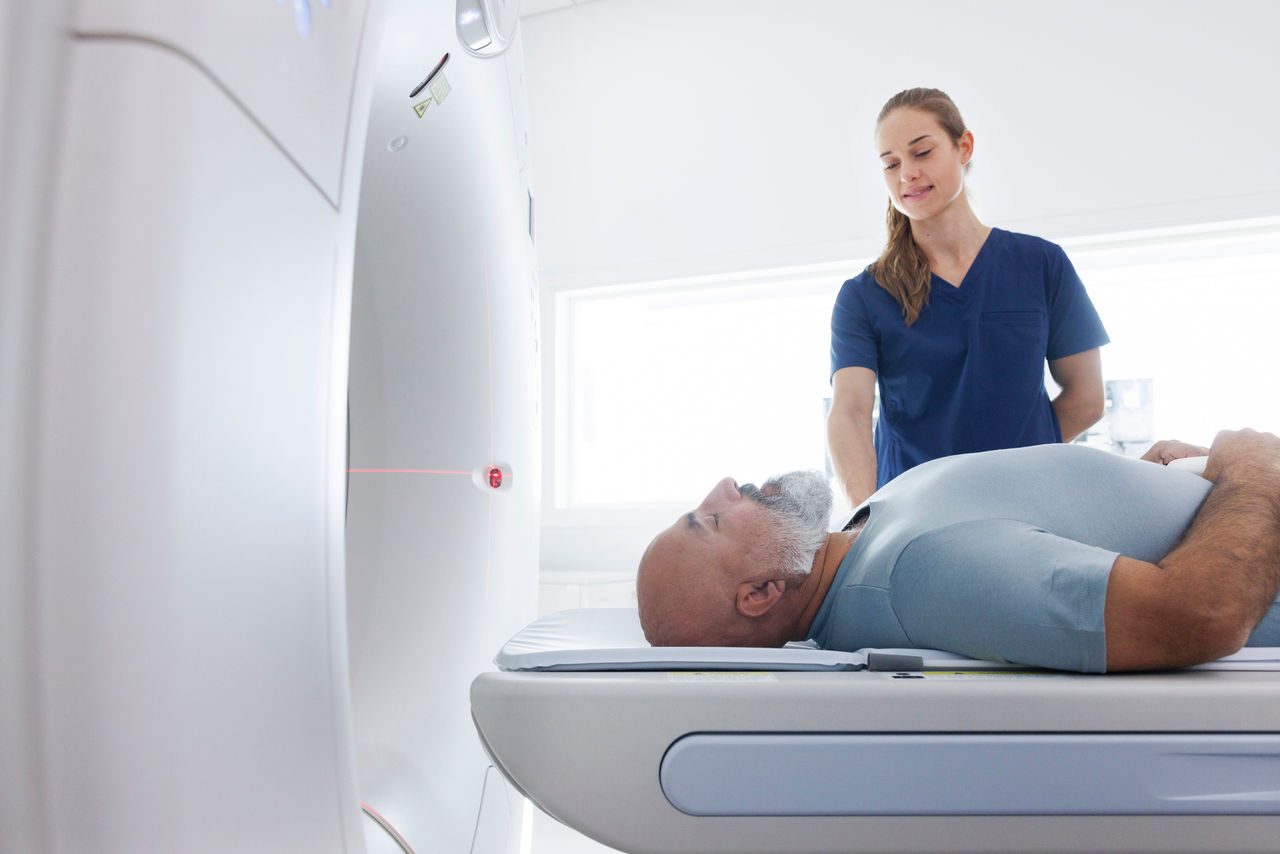Login
Radiation Oncology
What to Expect From Radiation Therapy
Your radiation therapy will likely proceed through the following steps.
Consultation
Your first appointment will be a consultation with your radiation oncologist, who will review your medical history and test results, and perform a physical examination. Additional medical tests may be needed to gather more information for planning your course of treatment. The treatment team will also take time at this appointment to explain the treatment process. You will learn about possible side effects from the treatment and the best way to manage them. An oncology nurse will be available to discuss health concerns with you and your family, before, during and after treatment.
Take time to write down information during this appointment so that you can refer back to it later. Use your personal treatment journal to help you keep track of your appointments, notes, symptoms and side effects, lab-test results and any medications you are taking. Bring your journal with you to each doctor visit. It will help you stay organized, and the information you record will be useful for your treatment team.
Simulation
If your radiation oncologist determines that radiation therapy is right for you, the next step is your simulation appointment. Prior to receiving radiation treatments, most patients have a simulation CT scan to record images of the parts of the body to be treated.
At this stage, your skin will be marked with small reference points to allow the therapist to aim the radiation at the exact same spot during each treatment. If necessary, specially made devices will be used to position your body exactly as it will be during the actual radiation treatments. The images captured during the simulation session are recorded by computer for further study during the next step of the treatment-planning process.

Treatment Plan
After your second appointment, the radiation oncologist will carefully design your treatment plan using the imported CT images from your simulation. Three-dimensional planning computers show the size and shape of the targeted tumor from all angles. This technology assists the radiation oncologist to determine the exact points at which radiation will enter your body, minimizing exposure to surrounding normal tissues. This makes it possible to prescribe the precise doses of radiation needed.
The information collected during your treatment planning is processed by the dosimetrist, who uses sophisticated computer software to calculate the radiation doses prescribed by the radiation oncologist. The treatment planning process may take several days. Your final treatment plan is reviewed by both the physicist and the radiation oncologist before you return for your next visit.
Simulation Check
This will be your third appointment. Prior to your first radiation treatment, you will have a simulation check to verify that the treatment planned for you will be delivered as prescribed. Using X-rays and lasers (red beams of light) the radiation oncologist and radiation therapist will check and record the targeted area and your exact position for the radiation treatments. After your treatment plan is verified, you are ready to begin therapy. Our office will schedule you for your first treatment session.
Your Radiation Treatments
Radiation treatments are generally given five days a week for a set number of weeks. Your doctor will determine the appropriate length of treatment for you. Daily visits last between 15 and 30 minutes and are scheduled in advance at an appointment time that is convenient for you.
At least once a week, additional time will be needed for you to meet with the radiation oncologist to discuss your progress. You may also meet with other members of the treatment team and other health care professionals, such as a nurse navigator, social worker or registered dietitian.
Even though you may feel completely well and notice few physical changes during the course of your treatments, it is very important to keep all your scheduled appointments, including the visits to discuss your progress and other health needs.
Before Each Treatment
Check in with the receptionist each day as you arrive for treatment to confirm your appointment and to be directed to the correct room. It is best to wear comfortable, easily removable clothing. Depending on the part of the body to be treated, you may need to change into a hospital gown. A private changing area is available. You may wear jewelry and a watch as long as the items are not worn on the body part to be treated. There are no restrictions on eating, drinking or taking medication before your treatment.

During Treatment
The therapist will position you on the treatment table. If your treatment method requires a specially made device to help ensure the correct area is treated, it will be applied at this stage. These devices are used to help keep you very still and ensure that the radiation remains targeted precisely on the tumor.
While the radiation is being delivered, the therapist will be just outside the treatment room operating the linear accelerator from a control panel. Using special cameras, monitors and microphones, the therapist is able to hear you, see you and talk to you throughout your treatment. As soon as the treatment ends, the therapist will return to the room to help you off the treatment table. Please do not attempt to get up yourself. You may then return to the dressing room to change.
Providers
Useful Links
-
Prostate Cancer Diagnosis — Do You Really Know "All" Your Treatment Options? -
Radiation therapy can stop or slow down Dupuytren's disease
Contact Us

Helen F. Graham Cancer Center & Research Institute
4701 Ogletown-Stanton Road,
Newark, DE 19713


ChristianaCare Radiation
Oncology at Union Hospital
152 Railroad Avenue
Elkton, MD 21921




